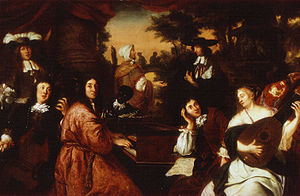
Johann Theile
Encyclopedia

Baroque
The Baroque is a period and the style that used exaggerated motion and clear, easily interpreted detail to produce drama, tension, exuberance, and grandeur in sculpture, painting, literature, dance, and music...
era, famous for the opera Adam und Eva, Der erschaffene, gefallene und aufgerichtete Mensch, first performed in Hamburg
Hamburg
-History:The first historic name for the city was, according to Claudius Ptolemy's reports, Treva.But the city takes its modern name, Hamburg, from the first permanent building on the site, a castle whose construction was ordered by the Emperor Charlemagne in AD 808...
on January 2, 1678.
Life
After studying Law in Leipzig and Halle, Theile took instruction in composition in Weißenfels. His teacher there was the great Heinrich Schütz
Heinrich Schütz
Heinrich Schütz was a German composer and organist, generally regarded as the most important German composer before Johann Sebastian Bach and often considered to be one of the most important composers of the 17th century along with Claudio Monteverdi...
, the most prominent German composer of the 17th century. Theile is believed to have been one of his last pupils, and is considered one of the most gifted among them.
Between 1673 and 1675 he held the position of Court Kapellmeister for the Duke Christian Albrecht of Schleswig-Holstein-Gottorp
Christian Albert, Duke of Holstein-Gottorp
Christian Albert was a duke of Holstein-Gottorp and bishop of Lübeck.He was a son of Frederick III, Duke of Holstein-Gottorp, and his wife Princess Marie Elisabeth of Saxony. Christian Albertbecame duke when his father died in the Castle Tönning, besieged by the King Christian V of Denmark...
. Some years later he held the position of Kapellmeister in Wolfenbüttel, where he commenced a musical apprenticeship to Johann Rosenmüller
Johann Rosenmüller
Johann Rosenmüller , was a German Baroque composer, who played a part in transmitting Italian musical styles to the north....
, who by this time had permanently returned to Northern Germany after having spent most of his career in Italy. He also worked in Naumburg, where he likewise held the position of Kapellmeister; Berlin, where he was active as a music teacher to the royal court; as well as Lübeck and Stettin, where he also served a music instructor. In 1673 he wrote his Matthäuspassionhttp://web.archive.org/web/20091027093137/http://geocities.com/johan_van_veen/cd_reviews/ORF_CD361.html (St. Matthew Passion) in Lübeck.
In 1694, Theile returned from a stint as a musical advisor to the Duke of Zeitz to his home town of Naumburg, where he died in 1724.
Theile’s compositions encompass Singspiels (German folk operas with spoken dialogue), Operas, Masses, Psalm settings, Passions (passion oratorios), Arias, Canzonettas, and Sonatas, as well as Motets. His sacred opera Adam und Eva was the first work to be performed at the Goosemarket Opera in Hamburg – the first Civic opera house in Germany. He also wrote a number of works on music theory, particularly on counterpoint. He also had an outstanding career as a practitioner and theorist in musical pedagogy. Theile taught Johann Mattheson
Johann Mattheson
Johann Mattheson was a German composer, writer, lexicographer, diplomat and music theorist.Mattheson was born and died in Hamburg. He was a close friend of George Frideric Handel, although he nearly killed him in a sudden quarrel, during a performance of Mattheson's opera Cleopatra in 1704...
. Dietrich Buxtehude was his most important pupil (despite having been nine years older and having pre-deceased him by more than a decade).

